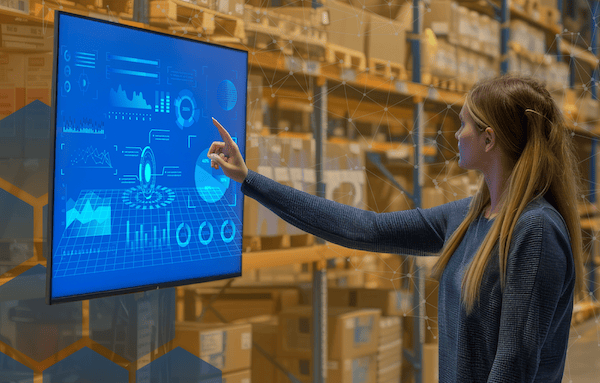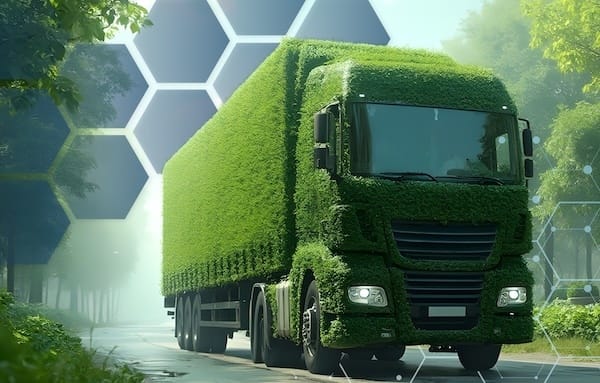- Warehouse Wisdom. Weekly.
- Posts
- Warehouse Wisdom. Weekly. 02/21/2025
Warehouse Wisdom. Weekly. 02/21/2025
Only the most relevant news for SMBs to improve logistics – picked, packed, and delivered without the bias.

Happy Friday!
Well, it finally happened. Walmart has officially fallen behind Amazon in total revenue. The retail giant, once the undisputed king of sales, has been dethroned by Jeff Bezos’ brainchild, proving once and for all that two-day shipping and an army of warehouse robots can, in fact, rule the world. Meanwhile, Walmart’s latest earnings report isn’t exactly screaming confidence for the retail sector, hinting that 2025 might be a tough year for sales. So, if you thought the economy was going to give supply chains a breather, think again—tighten those inventory belts.
This week, we’ll be breaking down all the latest in logistics, including FedEx’s big 2025 e-commerce report, a last-minute reversal on NYC’s congestion pricing plan, upcoming leadership changes at USPS, the downfall of a once-promising zero-emission trucking company, and more. Let’s jump in.
Freight and Shipping
Gridlock relief, green lawsuits, and USPS growing pains

New York City’s much-debated congestion pricing toll is officially not happening, thanks to a federal intervention that has commuters breathing a sigh of relief (and possibly still honking in celebration). The plan, which was supposed to charge drivers entering Manhattan’s busiest zones, has now been scrapped. For now, truckers and commuters alike can enjoy their usual gridlock free of charge.
Of course, even without congestion pricing, traffic still isn’t cheap. A new report estimates that traffic jams cost the trucking industry a staggering $108 billion in wasted costs. That’s right—billions of dollars burned while trucks sit bumper-to-bumper, idling away both fuel and patience.
Meanwhile, California’s truck emissions regulations are back in the legal spotlight, as the EPA is now considering revoking several state-specific waivers. If successful, this move could undo some of California’s strict zero-emission truck mandates—much to the relief of fleet operators and much to the dismay of anyone who enjoys breathing. The battle over emissions is far from over, but for now, it's back to the courtroom.
Speaking of leadership shake-ups, Postmaster General Louis DeJoy is reportedly preparing to step down from USPS. DeJoy, whose tenure has been eventful, has led the postal service through major cost-cutting measures, delivery slowdowns, and a never-ending stream of public scrutiny. The White House also announced that is will be placing the agency under the control of the Commerce Department.
And speaking of USPS struggles, the agency had to issue a formal apology this week over significant shipping delays in Indiana. Residents waiting on mail deliveries were left frustrated as packages crawled slowly through the system. USPS cited staffing shortages and logistical hiccups due to building changes as the cause, but at this point, slow mail service is less of a headline and more of a weekly tradition.
Stay up-to-date with AI
The Rundown is the most trusted AI newsletter in the world, with 1,000,000+ readers and exclusive interviews with AI leaders like Mark Zuckerberg, Demis Hassibis, Mustafa Suleyman, and more.
Their expert research team spends all day learning what’s new in AI and talking with industry experts, then distills the most important developments into one free email every morning.
Plus, complete the quiz after signing up and they’ll recommend the best AI tools, guides, and courses – tailored to your needs.
Marketplaces
Faster checkouts, fewer readers, and abandoned carts galore

E-commerce in 2025 is shaping up to be a fascinating mix of innovation and consumer impatience. According to FedEx’s latest report, a staggering 97% of shoppers abandon their carts simply because something was inconvenient. This means that after meticulously selecting items, weighing the pros and cons, and emotionally committing to a purchase, nearly everyone decides, “Actually, never mind.” If that statistic isn’t keeping online retailers up at night, it should be.
Adding to the retail industry’s collective headache, it turns out two-thirds of consumers aren’t even reading product descriptions. Companies have been pouring time and money into crafting detailed, compelling descriptions for their products—only to find out that most shoppers are either skimming or completely ignoring them.
Meanwhile, Adidas is the latest major brand to embrace Amazon’s Buy with Prime, further blurring the lines between independent retail and Jeff Bezos’ ever-expanding empire. More retailers are realizing that, if you can’t beat them, you might as well borrow their logistics network and let Prime members check out faster than they can second-guess their sneaker purchase. Efficiency wins, yet again.
Speaking of Amazon, the e-commerce giant has quietly pulled the plug on Inspire, its social commerce experiment. Turns out, convincing people to shop the way they scroll through TikTok wasn’t as inspiring as expected. But knowing Amazon, this isn’t a retreat—it’s just a pivot. Expect a new social shopping push soon, likely with an even catchier name and an even stronger grip on your wallet.
Logistics Vitals
Not just Amazon for Chinese sellers

Chinese sellers are rapidly taking over Walmart’s marketplace, following the same pattern seen on Amazon. Despite Walmart’s efforts to support U.S. sellers, Chinese merchants now account for a growing share of third-party sales. Key data points include:
41% of new sellers joining Walmart’s marketplace in 2024 are from China.
Chinese sellers make up just 28% of Walmart’s marketplace, up from 1% in 2021.
The country makes up over 50% of Amazon’s marketplace sellers.
Warehouse Tech and Sustainability
Electric dreams, autonomous ambitions, and one bankrupt trucking star

The shift from diesel to electric freight trains sounds great in theory—cleaner, quieter, and less reliant on fossil fuels. But according to a new Federal Railroad Administration study, making that transition is more challenging than expected. Battery-electric and hydrogen fuel cell locomotives show promise, but the infrastructure overhaul required is massive. Stay tuned...
Meanwhile, the road to zero-emission trucking just claimed another victim. Nikola, once the darling of hydrogen-powered trucking, has officially filed for Chapter 11 bankruptcy. This is the same company that once rolled a prototype truck down a hill to make it look like it worked, so maybe the writing was on the wall. Despite its high-profile collapse, the push for zero-emission freight isn’t going away—just don’t expect Nikola to be leading the charge.
But if zero-emission trucking is hitting speed bumps, autonomous trucking appears to be cruising ahead. Industry leaders claim driverless technology is closer than ever to full-scale deployment, with companies rolling out commercial tests and regulatory approvals inching forward. The promise? Safer, more efficient freight movement. The reality? We’re still waiting for someone to answer the question: Who’s liable when a self-driving truck inevitably takes the world’s most expensive wrong turn?
Global Freight and Logistics
Mother nature remains undefeated in bout versus logistics this winter

Severe weather is once again reminding the logistics industry who’s really in charge, with storms causing major disruptions to air shipments across the U.S. and Canada. From delayed cargo flights to a Delta plane sliding off the runway (thankfully, with no injuries), winter is proving to be a formidable supply chain opponent. Because nothing says “just-in-time delivery” quite like Mother Nature deciding it’s time for an ice storm.
Warehouse Quick Deliveries
FedEx gets smarter, e-commerce keeps growing, Canada’s top trucker heads south, and more…
FedEx acquires RouteSmart for improved route optimization.
Canada’s largest trucking company is re-domiciling to the U.S.
Ecommerce hauled in 17.9% of 2024 sales.
Alibaba posts e-commerce growth from AI.
65% of shoppers made a return last holiday season.
The U.S. Maritime Administration green lights Texas GulfLink port.
“Retailers that prioritize convenience, fast and transparent shipping, and frictionless digital engagement will lead the market.”

